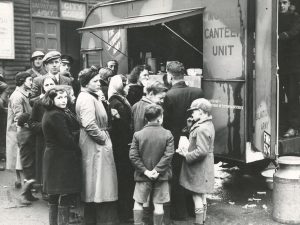An Army of action
Compiled by Jeff Curnow July and August have been challenging for The Salvation Army’s Emergency Disaster Relief Services. Here are few instances where the Army was called to service.
July 7
Northeastern U.S.—Flood Relief
Pennsylvania: A field kitchen in Wilkes-Barre served 4,000-5,000 meals per day. 4,000 clean up kits were distributed.
New York: Crews cleaned debris from houses. 1,000 clean up kits were distributed. Service centers were opened to provide assistance and distribute clean up kits.
New Jersey: More than 4,865 meals, 9,590 snacks and 8,513 beverages were served. In some areas feeding was done door to door.
July 8
Northern Virginia—Flood Relief
After 10 days of meeting needs due to floods, the Army concluded its feeding program in Virginia. Army canteens provided 4,412 meals, 9,726 drinks, 6,376 snacks, 223 bags of ice and 150 clean up kits.
July 10
Manhattan, NY—Building Collapse
The explosion and collapse of an Upper East Side townhouse injured 15 people—the Army served more than 750 people.
July 12
Chicago—Train Derailment
When a Chicago Transit Authority train derailed and caught fire in a tunnel during rush hour, canteens were immediately deployed.
July 14
Mumbai, India—Train Bombing And Flood Relief
The Army in Western India responded immediately to a train bombing that killed 200 and injured more than 700. The Army also provided food baskets to more than 400 families after flooding devastated areas of Mumbai.
California—Wildfires
The Santa Clara County fire was increasing in size and intensity. At the Yucca Valley fire, one canteen and three smaller support vehicles were deployed for three days.
Midwestern U.S.—Heat wave
Kansas City: The Bellefontaine Community Center was used as a cooling center. Volunteers in Kansas City and St. Louis, Mo., distributed cold drinks to people living on the streets.
Peoria, Ill.: The Salvation Army teamed with WEEK-TV to provide fans to elderly residents without air conditioning.
Minneapolis, Minn.: Social Services distributed 70 air conditioners.
Milwaukee, Wis: All Salvation Army buildings in the area were utilized as cooling centers.
July 21
St. Louis—Heat wave and
Storm Damage
The Army provided aid to residents after storms with 80 MPH winds and heavy rains damaged buildings and left more than 500,000 without power. Nine cooling centers provided residents with food, water and a safe haven from the deadly heat.
July 25
McGuire Air Force Base—U.S. Citizen Repatriation
Americans evacuated due to violence between Israel and Lebanon arrived at McGuire Air force Base, New Jersey. The Army assisted 10 flights of evacuees with personal hygiene products, phone cards, and emergency financial aid.
St. Louis—Power Outages
As power was restored, the Army continued to meet the needs of more than 500,000 without power for several days. Canteens delivered meals to residents, National Guard troops, emergency responders and electrical crews.
Emergency shelters and cooling centers assisted more than 2,000 people, including many elderly residents evacuated from nursing homes.
July 28
St. Louis—Feeding Effort Continues
After assisting more than 12,000 in six days, the Army issued a plea for donations as several days of continued need were forecast. 35,000 meals per day were distributed to those whose food had spoiled.
August 1
Florida—Tropical Storm Chris
As of 5 A.M., the third named storm of the 2006 Hurricane season, Chris, has formed. This storm bears very close monitoring.
August 3
Florida—Tropical Storm Chris
The forecast indicated that Chris appears not to be a threat.
August 4
Chicago—Power Outage
At the request of the City, Army personnel assisted thousands affected by a power outage during a deadly heat wave. Buildings without power included 11 senior citizen residences. In two days, Army personnel served 4,500 meals, 3,134 snacks and 9,392 beverages and provided 1,820 pounds of ice.











